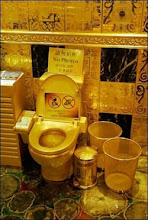
The Golden Latrine began to suspect that McDonalds did not have the most rigorous hiring policy after a friend listed "self-harm" on an application form under 'interests'. And still got the job.
The global fast food giant announced yesterday that it was creating 2,500 new jobs in the UK, sparking a debate about the worth of such "McJobs" - a term derived from Douglas Coupland's slacker bestseller Generation X, defined by Coupland as: "A low-pay, low-prestige, low-dignity, low-benefit, no-future job in the service sector. Frequently considered a satisfying career choice by people who have never held one."
Newspaper columinists and economists wrung their hands over this being the "wrong type of service job" (basic and low-skilled, rather than the creative, hi-tech jobs we're all supposed to crave in our glass-and-steel utopia), but is working in McDonalds really that bad? Is it the modern day equivalent of the blacking factory that Dickens' David Copperfield is sent to work in? Or is the real problem, as McDonalds themselves put it, "the prejudice that still exists around service sector jobs."
I can't help but think it's the latter. Charlie Brooker wrote a brilliant blog last year about working in a shop (you can read it here). He concluded:
What I disliked most about working as a shop assistant wasn't the occasional snooty customer, or the shop, or the hours, but they way people reacted when I told them I was a shop assistant – their automatic assumption that I didn't enjoy it. I didn't particularly enjoy my life at the time, but I did enjoy the job. Not every day, not constantly – but I liked it more than I disliked it.
This rang true for me. I worked in a call-centre and for the most part, angry clients and asinine corporate motivational videos aside, quite enjoyed it. Nevertheless I used to occasionally find myself on the receiving end of similarly nuclear levels of condescension - mostly from well-meaning types who felt I should be doing something more commensurate with my genius.
More annoying were the ethical objectors. I recall a trainee paramedic telling me, in complete seriousness, with pitying eyes: "I really admire what you do. I personally have to do a job that means something." To which the only appropriate retort is: try paying your rent in principles when your landlord comes a-knocking.
I worked in a call-centre to raise the money to do my journalism qualifications, so there was always an end-goal in sight. But reading the Guardian's reader debate on McJobs, most of the comments from past employees were reasonably positive. People said the job taught them discipline and in many cases, if it wasn't a glamorous life, well that was an incentive to work hard and do well.
And let's be honest, there are worse things to do for a living than fry chips and serve burgers. As one poster put it:
I worked at Burger King's for a while when a student. I definitely saw it as a step up from my job before uni (working at a kennels). Anyone who thinks fast food provides s**tty jobs should try one where the real thing is provided in large quantities.
What was most shocking was the level of vitriol directed at fast food workers. Several even reported being physically attacked by customers. In part that's likely to be because fast food places tend to stay open late to cater for the lairy throwing-out time crowd. But it's also because there is a general air of contempt that hangs around these jobs, which is fostered by the non-lairy professional class too.
A number of posters on The Guardian's discussion seemed to think that the correct response to "Would you like fries with that?" was "If I wanted fries, I'd have asked for them." Which is to miss the point that the server doesn't actually care if you have fries, they just have a script they have to stick to, and they get in trouble if they deviate from it. Personally I would have stabbed them in the eye with my till fob, no second thoughts.
McDonalds certainly has a diverse racial profile (mainly because a lot of Brits consider such service industry jobs beneath them) and the general consensus was that they promote from the shop floor. So next time you're wrecked and mouthing off in McDonalds/KFC/Greggs, spare a thought for the person behind the counter. This probably isn't their dream job, but it's a job, and right now that's better than nothing.
Have you worked in a McJob? The Golden Latrine invites you to share your experiences of unruly customers/psychopathic managers/terrible corporate videos below.




